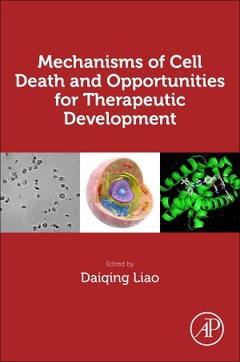Description
Mechanisms of Cell Death and Opportunities for Therapeutic Development
Perspectives in Translational Cell Biology Series
Coordinator: Liao Diaqing
Language: English
Keywords
ABT-199AIM2Anakinra; ACSL4Cancer; Anti-Cancer drugs; Apoptosis; Apoptosome; ASC; Autophagy; Bacterial infection; BCL2 protein family; BCL-2Canakinumab; BCL2Caspase; BH3 mimetics; Cancer; Caspase; Caspases; Cell based assays; Cell death; COVID-19Death receptor; Death receptors; Diabetes; Drug discovery and development; Endoplasmic reticulum stress; Extrinsic pathway of apoptosis; Ferroptosis; Fluorescence imaging; GPX4Iron metabolism; GSDMD; GSDME; Heat shock protein; IFI16Immunotherapy; Infectious disease; Inflammasome; Inflammation; Inflammatory disease; Inhibitor of apoptosis protein; Inhibitor of apoptosis proteins (IAPs)Intrinsic pathway of apoptosis; Kidney diseases; Ligands; Lipid metabolism; Lipids; Metastasis; Mitochondrial outer membrane permeabilization; Mixed lineage kinase domain-like protein (MLKL)Necroptosis; Necroptosis; Necrosis; Necrostatins; Neurodegenerative diseases; Neurons; NF-?B; NLRC4NLRP1NLRP3Pathogens; Osteoporosis; Oxidative stress; Polyunsaturated fatty acid (PUFA)Stoke; protein phase separation; Proteostasis; Pyrin; Pyroptosis; Receptor-interacting kinase 1 (RIPK1)Regulated cell death; Regulated cell death; Rilonacept; RIPK3SARS-CoV-2Tumor necrosis factor (TNF)Venclexta; Tumor necrosis factor; Unfolded protein response; Venetoclax; Viral infection
296 p. · 15.2x22.8 cm · Paperback
Description
/li>Contents
/li>Readership
/li>Biography
/li>Comment
/li>
Mechanisms of Cell Death and Opportunities for Therapeutic Development, volume four in the Perspectives in Translational Cell Biology series, offers content for professors, students and researchers across basic and translational biology. The book covers fundamental mechanisms, ranging from different forms of cell death and drug development, to efforts for treating disease, providing a valuable resource for readers interested in understanding cell death and relevant translational research. The book's editor, Diaqing Liao, has over twenty years? experience teaching topics of cell death.
1. An overview of cell death in health and disease 2. Cell death:machinery and regulation 3. Molecular mechanisms of cell death: A brief overview 4. Major methods and technologies for assessing cell death 5. Proteotoxicity and endoplasmic reticulum stress-mediated cell death 6. Protein phase separation in cell death and survival 7. Therapeutics targeting the BCL-2 pathway 8. Ferroptosis: lipids, iron, cellualar defese mechanisms and opportunities for drug development
in the fields of biomedical research and drug discovery and development including graduate students, postdocs and faculty in academia and scientists in research and development in biotech and pharmaceutical industry.
- Provides a comprehensive overview of current knowledge on the process of apoptosis, its potential role in health and disease, and a discussion of potential alternative forms, such as autophagy
- Covers fundamental mechanisms and relevant translational research
These books may interest you

Cell DeathMechanism and Disease 105.49 €

Cell DeathMechanism and Disease 157.74 €

Translational Inflammation 145.45 €

